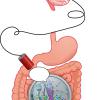News and Press Releases
Oct 16 2015 | Stanford News
Our emotions can override the brain's calculations, leading to otherwise irrational decisions like charitable donations.
Oct 15 2015 | Stanford News
Stanford engineers have created a plastic skin-like material that can detect pressure and deliver a Morse code-like signal directly to a living brain cell. The work takes a big step toward adding a sense of touch to prosthetic limbs.
Oct 14 2015 | NeuroTalk S2E3: Peter Bandettini
NeuWrite West talks with Peter Bandettini, Chief of the Section on Functional Imaging Methods, in the Laboratory of Brain and Cognition at National Institute of Mental Health.
Oct 13 2015 | NeuWrite West - New in Neuroscience
As worrisome as they may be, sleep twitches, termed “myoclonic twitches”, are not exclusive to our bad dreams.
Oct 13 2015 | Insights By Stanford Business
How can women be strong leaders at work without being labeled as “bossy” or viewed as less likeable than their male peers?
Oct 7 2015 | Stanford Medicine - News Center
The Stanford Concussion and Brain Performance Center was established last year to define objective criteria for diagnosing concussions, and to treat adults and children based on the physical response of the brain.
Oct 7 2015 | Stanford Graduate School of Education - News Center
The study co-authored by Professor Thomas Dee provides helpful information for parents deciding when their child should enroll in kindergarten.
Oct 6 2015 | NeuWrite West
A few neuroscientists who have recently ventured to think outside the brain have revealed that the bacteria that reside in your digestive system – your gut microbiota – have the capacity to influence emotions and even behavior.
Oct 6 2015 | Stanford Medicine - News Center
The awards are designed to encourage scientists to pursue creative research projects with the potential of leading to big improvements in health care.
Oct 5 2015 | NeuroTalk S5E4: Anne Churchland
NeuWrite West talks with Anne Churchland, Associate Professor at Cold Spring Harbor Laboratories.













